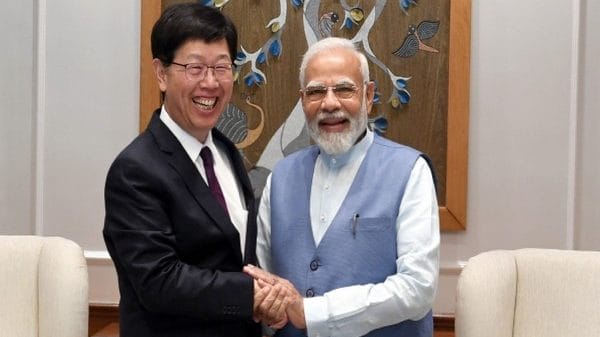On the occasion of India’s 75th Republic Day, the government announced that it was honouring Young Liu, Chairman and CEO of Taiwan’s Foxconn, with the Padma Bhushan, India’s third-highest civilian award. This development drew considerable attention for various reasons. Most notably, Young Liu stands as the first Taiwanese national to be conferred with Padma Bhushan.
While certain commentators have linked this news to the strained relations between India and China, it is crucial to emphasise that this recognition is detached from the geopolitical dynamics with China. Conspicuously, these perspectives are largely confined to some Indian commentators and portals. The Chinese social media users do not interpret Foxconn’s expansion and India’s interest in Taiwanese companies as actions directed at China. Most perceive this latest development as part of India’s aspiration to establish itself as a central player in the global manufacturing landscape, particularly within the Apple supply chain.
Over the years, Foxconn has consistently expanded its footprint in India. The India-Taipei Association, the representative office of India in Taiwan, highlighted that “this honour serves as a testament to Foxconn’s success story in India, further emphasising India’s growing stature as an electronics manufacturing hub.”
Also read: India’s three former service chiefs held a closed-door meet in Taiwan. Here’s the inside story
Liu remains committed to India
In 2015, Foxconn strengthened its commitment to the Narendra Modi government’s ‘Make in India’ initiative. The company forged a partnership with Sony to produce Bravia televisions, leading to the establishment of a manufacturing plant in Chennai, Tamil Nadu. Subsequently, in 2017, Foxconn expanded its manufacturing operations to include the production of iPhone SE in Sriperumbudur, Tamil Nadu.
Since Liu’s taking over as CEO in 2019, Foxconn’s commitment to and expansion into India has been remarkable. During the 2023 Semicon India event, Liu, in his keynote address, reassured India: “Taiwan is and will be your most trusted and reliable partner. Let’s do this together”. PM Modi also conveyed to Liu, “IT stands for both India and Taiwan.”
In July 2023, the collapse of the $19.5 billion Foxconn-Vedanta joint venture, which sought to establish India’s first chip manufacturing plant, prompted pessimism about the long-term plans of Taiwanese companies in India. This development was perceived as a setback for the prospects of India-Taiwan relations, particularly concerning Taiwan’s potential role in India’s semiconductor journey.
However, Foxconn announced that it was still committed to expanding in the Indian market and that “it is working toward submitting an application related to [the] Modified Programme for Semiconductors and Display Fab Ecosystem.” From August 2021 to March 2022, the Indian government approved incentives amounting to $3.57 billion for Foxconn, marking it as the first global company to receive benefits under India’s production-linked incentive (PLI) scheme for mobile manufacturing. Media reports suggested that Foxconn was actively pursuing the establishment of at least four fabrication lines in India, and had signed memoranda of understanding with two technology partners.
As Foxconn continues to expand its operations, the impact on local economies is significant, particularly in regions like Tamil Nadu, where the manufacturing landscape is rapidly evolving to meet global demands.
In 2023, Foxconn declared that its Indian operations had already reached approximately $10 billion annually, attributing this success to its network of 30 factories. India currently contributes five percent to the company’s overall annual revenue, and Foxconn employs over 40,000 Indians, making significant contributions to initiatives such as Make in India, Self-Reliant India, and employment generation.
Foxconn, a pivotal manufacturing partner for Apple, is actively championing an increased manufacturing footprint in India. In 2023, 12-14 percent of global iPhone shipments were produced in India, with Foxconn overseeing 75-80 per cent of the country’s production capacity. As a component of Foxconn’s expansion strategy, a new facility in Karnataka is poised to open, aiming for an annual production capacity of 20 million smartphones, mainly iPhones.
India-Taiwan relations are much more than China
The Covid-19 pandemic laid bare vulnerabilities in global supply chains, compelling countries such as India and Taiwan to delve into the creation of alternative supply chains. Both countries harbour a shared objective of adjusting to the changing economic landscape and diminishing reliance on China, aiming to safeguard their respective economic interests.
It is important to avoid a myopic perspective when assessing India-Taiwan relations, as geopolitical considerations are not the sole driving force. The initiatives undertaken are not targeted at China. The developments in India-Taiwan relations are rooted in mutual benefit, with a focus on advancing economic ties. These efforts align with the objectives of the unofficial relations established through reciprocal representative offices in each other’s capitals.
The conferment of the Padma Bhushan upon Liu underscores his steadfast commitment to expanding operations in India and actively participating in the country’s growth story. Liu appears to recognise and appreciate the significance of Taiwan playing a greater role in India’s ascent, understanding that Foxconn and Taiwan cannot afford to overlook this opportunity. This award also signals progress in the swiftly growing economic ties between India and Taiwan.
Limiting the interpretation of this award and any progress in India-Taiwan relations exclusively to the context of China overlooks broader considerations and diminishes the agency of both countries to jointly pursue their interests. The foundation of India-Taiwan relations lies in merit, complementarity, and mutual benefit, transcending the confines of a China-centric lens. This perspective should also be applied to the exceptional honour bestowed upon Liu and his notable contributions to India.
Sana Hashmi, PhD, is a fellow at the Taiwan-Asia Exchange Foundation and George HW Bush Foundation for US-China Relations. She tweets @sanahashmi1. Views are personal.
(Edited by Prashant)






